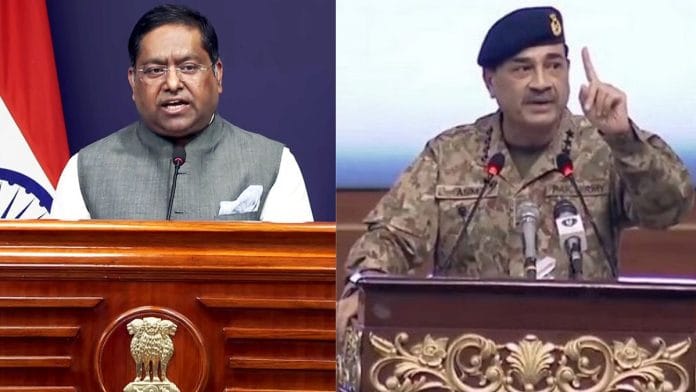New Delhi: Pakistan is hiding its “own failures” by whipping up anti-India sentiments, Ministry of External Affairs (MEA) spokesperson Randhir Jaiswal said Thursday. This comes days after Pakistani Prime Minister Shehbaz Sharif and former foreign minister Bilawal Bhutto both threatened India over the Indus Waters Treaty and Army Chief Asim Munir launched a nuclear broadside from American soil.
“We have seen reports regarding a continuing pattern of reckless, war-mongering and hateful comments from Pakistani leadership against India. It is a well-known modus operandi of the Pakistani leadership to whip up anti-India rhetoric time and again to hide their own failures. Pakistan would be well-advised to temper its rhetoric as any misadventure will have painful consequences as was demonstrated recently,” Jaiswal said at a press briefing.
Last week, ThePrint exclusively reported that Field Marshal Asim Munir, while speaking at a black-tie dinner in Tampa, Florida, threatened to plunge the region into nuclear war should his country face an existential threat in a future war with India. He is learnt to have said, “We are a nuclear nation, if we think we are going down, we’ll take half the world down with us.”
Days later, PM Sharif promised to teach India a “lesson” if it attempted to “snatch” a single drop of Indus waters. Bhutto also joined in the chorus of threatening India over Indus waters.
Days after the 22 April Pahalgam terror attack, India announced a set of punitive diplomatic measures against Islamabad including holding the Indus Waters Treaty (IWT) of 1960 “in abeyance”. The Pahalgam attack left 26 people dead in Jammu & Kashmir.
New Delhi has highlighted the role of terrorists emanating from across the border as the masterminds behind the attack. India launched Operation Sindoor on 7 May targeting terrorist complexes across Pakistan including Bahawalpur and Muridke. Islamabad escalated the situation with attacks at Indian military facilities, leading to an 87-hour conflict that was paused on 10 May.
India has maintained that the IWT, which has been a cornerstone of its ties with Pakistan over the six decades, cannot operate as long as Islamabad continues to support terrorism. New Delhi has said that “blood and water cannot flow together”.
India rejects arbitration award
In a separate case related to the flow of Indus waters, the Permanent Court of Arbitration (PCA) in the Hague issued a final award on the “general interpretation of the IWT” on 11 August. India rejected the award Thursday, asserting that the PCA does not have the “legality, legitimacy or competence” on New Delhi’s “utilisation” of Indus waters.
“India also categorically rejects Pakistan’s selective and misleading references to the so-called ‘award’. As reiterated in our press release of 27 June 2025, the Indus Waters Treaty stands in abeyance by a sovereign decision of the Government of India, taken in response to Pakistan’s continued sponsorship of cross-border terrorism, including the barbaric Pahalgam attack,” said Jaiswal.
The award issued on 11 August is on a case filed by Pakistan at the court in 2016 as both countries locked-horns over the Kishanganga river and Ratle hydroelectric projects. The issues first surfaced in 2007, when Pakistan raised objections to India’s 330 MW Kishanganga project.
India has maintained, while the treaty was active, that the issues must be resolved through the appointment of a “neutral expert.” In 2015, Pakistan agreed to the appointment of a neutral expert, but backtracked from this position, before filing a case before the PCA in the Hague in 2016.
New Delhi rejected the constitution of a court of arbitration. In June, India rejected a “supplemental award” that questioned the court’s competence to rule on the case, subsequent to India holding the IWT in “abeyance.” New Delhi rejected the supplemental award at the time as well.
(Edited by Gitanjali Das)
Also Read: With nuke lunacy, Asim Munir joins Pakistan’s Hall of Generals who swapped brains for bluster







Hw.come most Indian hindu politicians are physically very ugly compared to their counterparts in Pakistan and elsewhere…Rahul Gandhi being one of tge very few exceptions